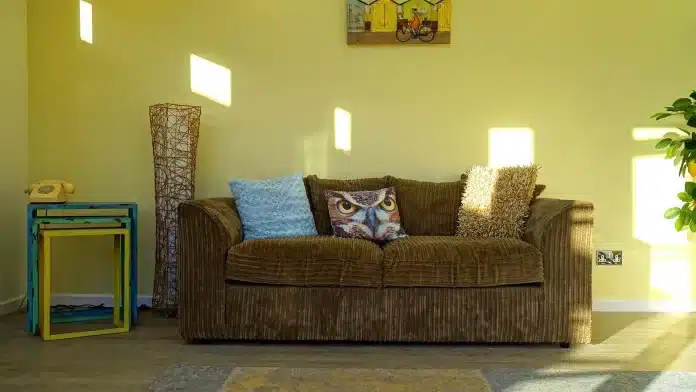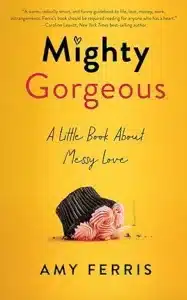I was on the couch, enjoying a good book for once. It was summer. The pandemic was sort of over, and I wasn’t working without childcare, at least, as I’d been the last two years, and so sanity was hovering closer to the line of normal than usual, if you didn’t read the news.
We were in a heat wave. I basked in AC splendor, on the couch, and for most of the time I could forget about the impending electric bill—the cost of electric had gone up drastically this year and we hadn’t yet used our AC for a billing cycle, and who knew what to expect? Or the rats that had stationed themselves under our porch, probably due to the city’s construction. But also (and I don’t admit this to too many people) maybe due to our habit last winter of throwing Fuzzy’s bunny poops out the back door, one by one, when he’d mark his territory on the door mat?
I was enjoying a good book for once, on the couch. Ralph was snoring beside me, an eighty-pound heating pad, who occasionally transformed into a barking, nipping hot mess when anyone entered our home—including everyone he knew and didn’t know—eliciting extended family members to mutter, “I think he’s gotten worse.” George, a former children’s therapy dog, was elegantly splayed on her dog bed beside the gas fireplace, looking timeless, I told myself, even though, at thirteen, her clock was ticking.
I could never live without George. I could probably live without Ralph.
I was enjoying that great book, anyway, for some time, with my animal friends, in my lovely home that I was considering putting on the market, even though we’d have nowhere to go—because: rats. (I love this home, actually; I’ll never leave.
Unless I have to. Or want to.)
Such a good book, but after two hours passed, and Leo had been home from his run for one hour, the calm became too eerie, so I told Leo he could finally go upstairs and shower. He’d been drenched in sweat at first but it was now dried, and he was standing in the kitchen looking at videos on TikTok, I assumed, and smelling like onion salad, for sure. Now that he was shirtless, I wondered where he’d placed the shirt.
“It’s okay to wake them,” I said, releasing him of his purgatory, which would close the door to my splendor.
“Are you sure?”
“They’ll never sleep tonight if you don’t.” I felt low-blood-sugar suddenly. I kept my eyes on my book as he whiffed by.
Behind two glass doors before me the rabbit was nibbling on a stick of hay in his room—I mean the playroom that he’d overpowered—as though it were a cigar.
Leo descended the staircase minutes later without having showered. He had two hot muffins in tow: one, five years old and sweaty-cheeked with curly hair flinging itself free of a braid; she was bare-foot and leaning on the banister. The other, red and puffy, two years old, was in his arms.
“We,” the five-year-old said, proudly, “were in the attic! We were,” but her face changed as she watched my face, which must have been moving on its own without my telling it to, and so did her tone, “having an…adventure?”
In our attic—which is separated from the five-year-old by another room and a door that is suctioned shut by a long shard of insulation foam—is glassy-breaky-stuff, a giant air conditioner with lots of tubes that looks like the inspiration for the next Stranger Things villain, and worst of all two windows that curiously peer toward the yard and the road, and whose sufficiency I’ve still never tested. Anxiety surged, as it’s wont to do.
During my moment of rest, my children could have fallen out the windows.
My sanity equals my dead children.
I wasn’t even resting that much.
The book dropped. I examined my children. I interrogated the one who talked well: “How are you feeling? Did you touch the AC? Did you touch the windows? Are you okay? Are you too hot? Were you ever afraid you couldn’t get out?” I said some of these questions out loud until I forced myself to let the others leak out more gradually.
Leo said, “They were just calmly sitting there reading.”
“Wow,” I said.
“They had also gotten out our old wedding vases” (enter: glassy-breaky-stuff).
“It’s okay to go up there,” I said to my five-year-old, “with a grownup. There are lots of sharp things up there. Do you have any splinters?”
It is my job to worry—I think—to protect them from danger.
“I don’t think so?” said my five-year-old, whose sense of adventure was, perhaps, being overshadowed by my sense of impending doom.
It is my job to be free and joyful—I think—to keep them alive.
“Let’s go up there again sometime, all together,” I said, smiling. “I’m glad you had fun. You’re not in trouble. We’ll do it safely next time.”
Her expression suggested suspicion.
The littler one said, “I’m poopin’, Mama.”
I knew she was done pooping, and that she just had not yet mastered the use of past-tense, but I was tired, so I said, “Are you still poopin’?”
“Da,” she said, which meant yes. Which just meant she didn’t want me to change her. Which was fine with me.
That bought some more time on the couch. Leo went up to shower and the two girls and I sat on the couch and read the books they had found up there. I sat in the middle; their hot bodies warming me, so odious and sweet. A clean diaper and packet of wipes was nearby on the coffee table, a warning that this moment would never last, which made it all the purer. Their curly hair touching my chin.
George hadn’t moved from her slumber; she had entered a new stage of her life called don’t-give-a-fuck, of which I was jealous, even if it meant that attitude grew stronger, it seemed, the closer you got to dying. Maybe that was a consolation prize for it all being over some day—or a preview of the freedom yet to be.
I gave so many fucks.
I read a book about a hippo becoming friends with an ancient tortoise, which is totally against all reptilian instincts, and I nearly cried. My children were still close, and their sweat reminded me of the summer we inhabited, and the shower running upstairs hoped for Leo’s own relief, and the milkweed blooming outside kept the butterflies close, and the rabbit splayed out on his side in his room, his soft belly sighing, meant he was happy, so I was happy, and my children’s small hairs were sticking up from the cool of the AC on their backs and arms, and the sun streaming through the window made my littlest interrupt the reading multiple times to say, “I see sun, Mama,” and as I imagined their soft bodies pushed through the window glass of the attic, and landing with a thud, on the hard ground, forever, I had to imagine holding them tightly to me—I couldn’t squeeze them for real, as the older one, in becoming herself, was known to elbow me away.
Marni Berger holds an MFA in writing from Columbia University and a BA in Human Ecology from College of the Atlantic. Marni’s short story “Hurricane” appeared in The Carolina Quarterly 2020 summer issue and her short story “Edge of the Road with Lydia Jones” was nominated for a Pushcart Prize (Matador Review). Her short story “Waterside” appeared in Issue 96 of Glimmer Train.
Marni’s work has also appeared at Motherwell, Barnstorm, The Manifest-Station, The Common, The Days of Yore, The Millions, Lotus-Eater, COG Magazine, The Critical Flame, Drunk Monkeys, Wilderness House Literary Review, and Fringe Magazine. She has been a finalist or received honorable mention in nine Glimmer Train contests and one New Millennium Writings contest. Marni’s novel-in-progress, Love Will Make You Invincible, is a dark comedy about a mother and her precocious tween, who, refusing to believe his long-lost father has committed suicide, instead becomes convinced that his father is a citizen of a secret underwater village. Marni lives in Portland, Maine.
She has taught writing at Columbia University and Manhattanville College. She currently teaches writing at University of Southern Maine.
***
Wondering what to read next?
We are huge fans of messy stories. Uncomfortable stories. Stories of imperfection.
Life isn’t easy and in this gem of a book, Amy Ferris takes us on a tender and fierce journey with this collection of stories that gives us real answers to tough questions. This is a fantastic follow-up to Ferris’ Marrying George Clooney: Confessions of a Midlife Crisis and we are all in!
***

